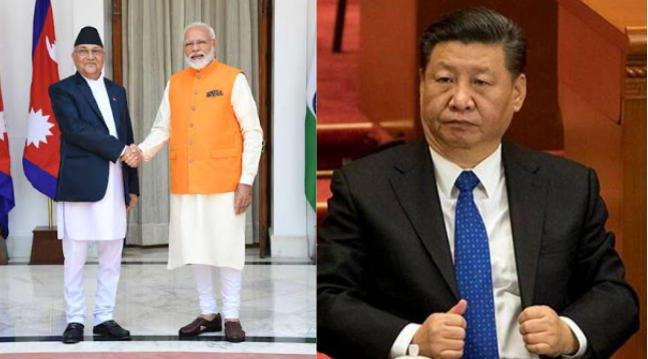Almost as if the carpet was swept right beneath China’s expansionist legs, the swiftness with which India has managed to reign in Nepal is a testament to India’s increasing soft power. China which had Nepal under its clutches is now shell-shocked as the latter drift towards its natural ally India. Cornered and spooked, China unsurprisingly has restored to propaganda in a desperate bid to mask its failures.
Irked by the twin visits of Indian Army Chief Mukund Narvane and Foreign Secretary Harsh Vardhan Shringla to Nepal, a defeated China yet again resorted to propaganda. Irony died a thousand deaths as Chinese President Xi Jinping’s favourite propaganda outlet, Global Times claimed that India has a “hegemonic mentality.”
In its article titled, “With hegemonic mentality, India is wary of China meeting in Nepal”, Global Times left no stone unturned to mask Xi Jinping’s foreign policy failures.
The article claims that “Border tensions between China and India have not yet been defused. Meanwhile, New Delhi is confronting border conflicts with Kathmandu.” It then added, “Indian Army Chief General Manoj Mukund Naravane thus paid a three-day visit to Nepal earlier this month with an unspoken goal: to reduce pressure from the Nepalese side.”
These are nothing but white lies as it is China which is guzzling Nepalese land which has perhaps pushed Nepal to ditch China in favour of India. China being true to its characteristics has quietly and illegally grabbed Nepalese land in at least seven bordering districts, much to the chagrin of the locals.
While Global Times goes wax lyrical over Chinese Defense Minister Wei Fenghe’s visit to Nepal, where in reality, it’s a belated visit in light of India’s recent manoeuvres in Nepal, which the Global Times spins it as a “coincidence”.
Much has been written about Chinese Ambassador Hou Yanqi has personally intervened on multiple occasions to ensure the stability of the Communist government in Nepal but that doesn’t stop Global Times from spreading lies. The propaganda outlet in its article claims that “India tends to interfere in Nepal’s domestic affairs from time to time. All these factors are unfavourable factors for Nepal’s national stability — hence the country hopes to pursue independent diplomacy.”
Unsurprisingly, Global Times conveniently leaves out the fact that Nepalese Prime Minister PK Sharma Oli recently snatched of the Defence ministry portfolio from the pro-China politician, Ishwar Pokhrel.
Read More: After removing its pro-China defence minister, Nepal begins a battle against China at the border
While Global Times accuses India of manipulating public opinion, it is China’s expansionist policy which is severely affecting the country’s image across the world. “These include spreading rumours about the so-called China threat theory and that China is “slowly invading” other countries. This has lamentably influenced other countries’ foreign policies,” writes Global Times.
Let’s take a look at how China rewarded Nepal for the latter’s unflinching loyalty to Xi Jinping and his lackeys. Earlier in June, China quietly occupied the territory of Nepal’s Rui village. The Chinese government even removed signboards in the Nepali language to legalize the occupation and has added it into the Tibet region.
In August, China illegally grabbed Nepalese land in at least seven bordering districts. Nepali government agencies data reveal that China is gradually moving forward in these districts with the ultimate agenda of encroaching upon more and more landmass.
More worryingly for Nepal, the official estimates of China encroaching Nepalese land in seven bordering districts is likely to be underreported with the scenario expected to be much worse.
The Oli government was recently put in a spot when the news of China illegally having built 11 buildings in Humla with a border pillar missing, trickled out, resulting in protests outside the Chinese embassy in Kathmandu resulting in clashes.
After locals flagged concerns that China was constructing building 2 kilometres inside Nepalese territory, the Chinese embassy attempted to brazen it out. “China and Nepal are friendly neighbours. China has always respected Nepal’s sovereignty and territorial integrity. The building mentioned by the media has been verified to be on the Chinese side of the China-Nepal border and Nepali side may make verifications again. China and Nepal have no territorial disputes. The two sides have always maintained close communication on border affairs,” said a spokesperson of the Chinese embassy in Kathmandu.
In what reveals the growing Chinese influence in Nepal, 50-year-old Nepali journalist, Balaram Baniya who exposed the Chinese encroachment in Rui village was found dead under mysterious conditions in August. The journalist’s body was found at the banks of Bagmati River with his death shrouded in mystery as his tragic demise came close on the heels of his article highlighting the Chinese encroachment in Rui village.
It is one thing to be smitten by Chinese yuan and hence parley to the orders of Xi Jinping, however, no democratic leader can escape the wrath of the public when the country’s sovereignty is repeatedly put in danger and that’s exactly what has happened in Nepal.
Read More: Nepal warms up to India as it rolls back books with maps that claimed Indian territories as Nepal’s
Tired of China’s continual illegal grabbing of Nepalese land, Oli has finally come into his senses and has decided to engage with India to counter the Chinese aggression as at the end of the day, he’s answerable to his electorate — something which the tyrant and dictator Xi Jinping will never understand.
